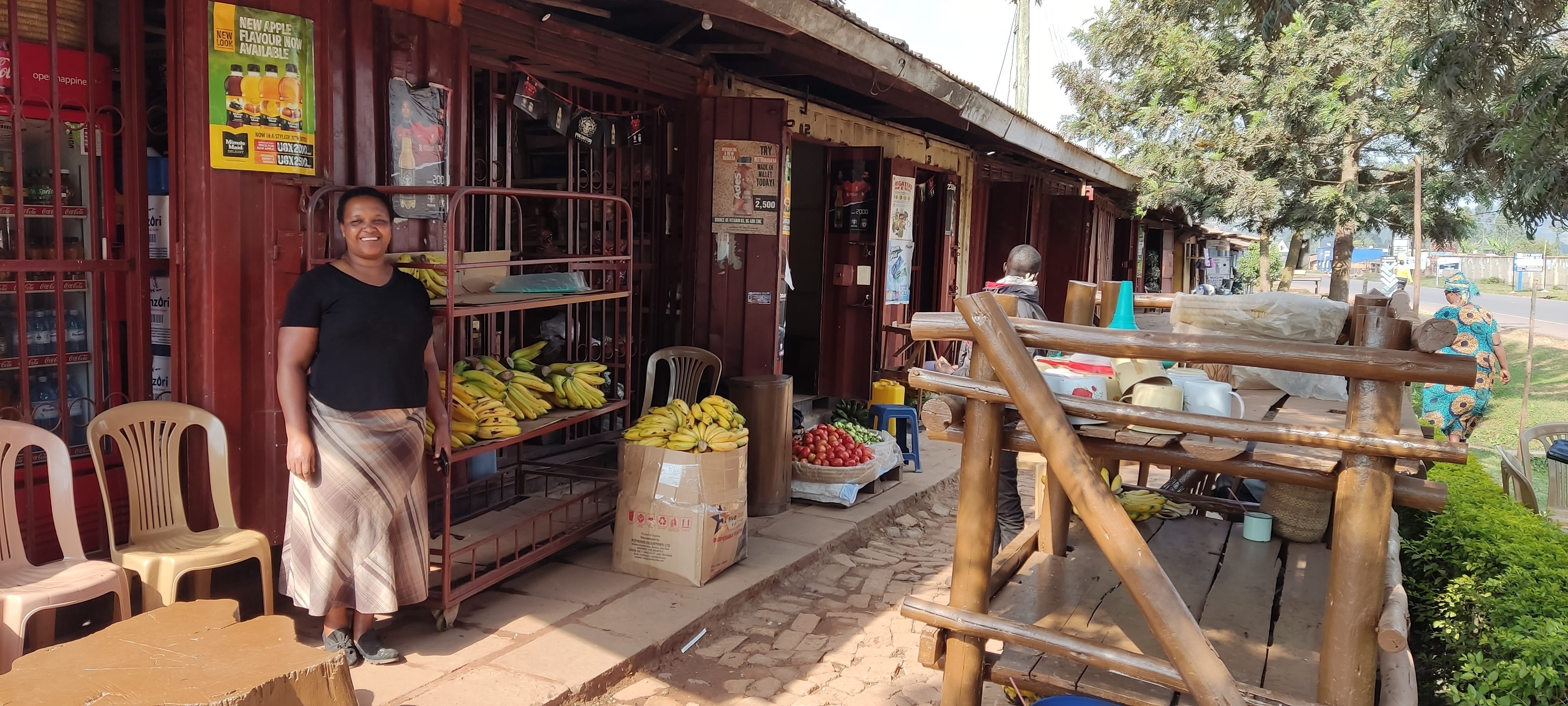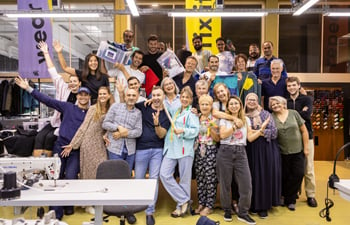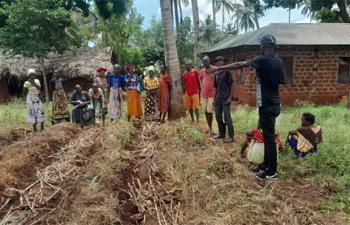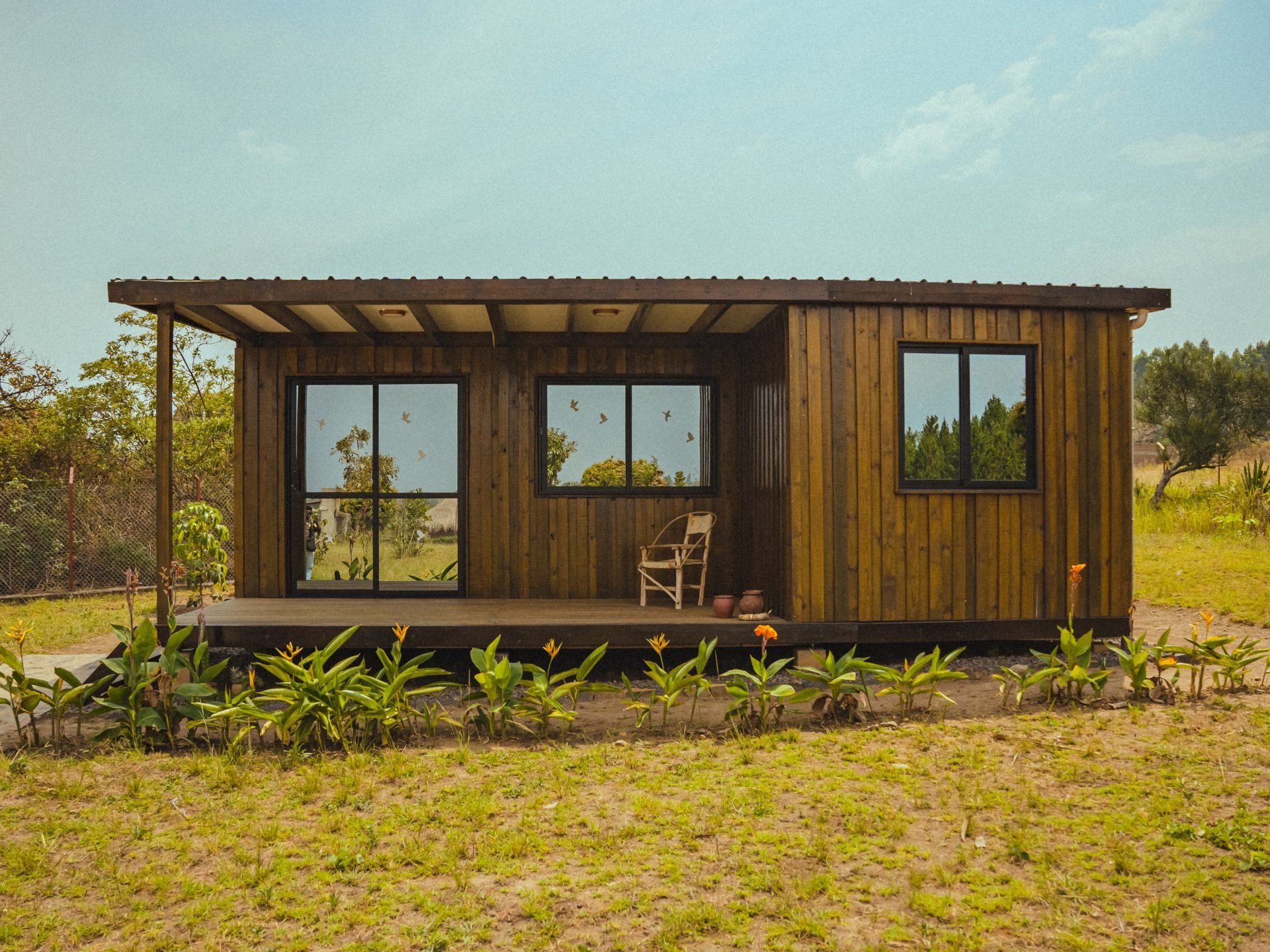6000 Farmers are transitioning to agroecology bringing all of its benefits to the farm and to the plate. More children are accessing healthier meals at home and at school. More than 5000 residents have been reached with messages on sustainable food diets for behavioral change. Household revenues are improving due to the loans provided and proceeds from improved farm or backyard garden production. Local government leaders are increasingly understanding the connection between a sustainable food system and social development. The multi-stakeholder approach of KMDF, is spreading ripple effects across various sectors of the society – starting to create a sense of ownership and responsibility by ordinary citizens to take better care of their land, diets, and incomes at household level.

A member of the Kijuguta Kyetobokyeire, an urban backyard farmers’ group, proudly presents their local food store. Apart from an outlet for the produce they grow at home, it is also a vivid neighborhood meeting place for residents to wind down the day over gourds of “Enturire”, their local delicacy of sorghum-and-honey brew. The residues from brewing make animal feed, the animals produce manure to feed the soil.
It all starts with a visionary leader
“To break the cycle of poverty for people living in our city,” Mable Tumuhaise created KMDF, the Kabale Municipality Development Foundation in 2010. From forming forums to unite and represent the voice of local residents, market vendors, transporters, artists and musicians to COVID-relief efforts, KMDF has been active on a lot of fronts since 2010. “But realizing that poverty reduction, health and economic opportunities all start with healthy food and how it is produced, the sustainable food initiative soon became our key focus”. Launched in 2017, KMDF’s Sustainable Food Initiative works on 3 key areas: growing, delivering and enjoying local food. The initiative has been brought to scale with funding from the DOEN Foundation since 2020; supporting more members of the local food coop to transition to agroecology and more local residents to access local, healthier, diversified diets.
“The participatory planning from the start, really helped us!” affirms Mable. Involving all stakeholders (farmers, food vendors, processors, restaurants, local authorities, community-based organisations, short-distance transporters, etc.), has been a strong starting position that led to a coherent, supported food system change strategy.
Impact starts with good food and good health
“I was in very poor health for a while,” says Dinavensi Tumwesigye of the Kahama Runyanjoka Farmers’ Group, “until a KMDF extension worker came to my home and introduced me to vegetable growing and healthy diets. As a diabetic, I have since seen dramatic improvement on my health, which I strongly attribute to the changes I have made to my diet. I now grow a variety of local food on my small family farm, and together with my group members, we are propagating this knowledge in our community.”
The farmers’ group of Kahama Runyanjoka. High on the hill, just a stone’s throw away from the Ugandan border with Rwanda, these smallholder farms produce a wide variety of crops for home consumption, the local market and artisan processing.
More work to be done: restoring soils and watershed
Located in the Southwest of Uganda, Kabale municipality sits at an altitude of 2000 meters above sea level. The local climate is somewhat different from the rest of the country: chilly days, cold nights; and rolling hills that originally were covered with lush vegetation of montane forest trees and shrubs. But deforestation and land degradation are widespread, leaving the hills bare and eroded or otherwise planted with monoculture woodlots of eucalyptus and pines.
“Look at my garden, the drought is severely affecting us”, says a local farmer in Kijuguta Kyetobokyeire when visited at the peak of the main dry season in July. “I would need a loan to invest in rainwater harvesting and organic manure to make my farm productive again.” While rainwater harvesting is a key tactic, these farmers and KMDF should be looking at restoring the entire watershed. Reforesting the hills with native trees and agroecological intensification on family farms; rebuilding back soil organic matter, protecting waterways, employing permaculture principles in soil water capture and retention would all go a long way in building a truly regenerative food production system.
Food system initiatives in Uganda
Food system initiatives are usually led by one or more civil society organisations (CSO) that systemically work with local government authorities, other CSO, social entrepreneurs and other stakeholders to transition to a more local, healthy, resilient and regenerative food system in and around the city. Currently only 3 cities in Uganda have a running multi-stakeholder process that fits this systemic and transition-oriented definition. In Mbale, Rikolto leads a multi-stakeholder initiative called Good Food for Cities; KRC leads the Fort Portal city food lab; and in Kabale, the Sustainable Food Initiative by KMDF.
On the other hand, many projects and activities that could be elements of a larger, more holistic food system initiative, and 100+ stakeholders were identified across the country – as well as a few partial or aspiring food system initiatives in Gulu, Kampala, and Bushenyi. These elements range from farmer training or community seed banks to water, sanitation, and health projects, from food security interventions to livelihood projects, youth food business incubation and value chain approaches.
Building the ecosystem
While food systems thinking aims for impact on multiple levels of the value chain and so-called ‘food web’, food system initiatives as such are not the holy grail. Sometimes doing less (e.g. focusing on a certain product or value chain) – if done in a systemic way – might mean more impact. Multiple actors are needed to be working together at different levels in a coordinated way. A multi-stakeholder approach that is intentionally systemic and transition-oriented, is key to bringing these contributions together on a local, district, regional and national level. Here are 3 highlighted recommendations:
- Funders like the DOEN Foundation can (continue to) finance multiple holistic food systems initiatives at local, municipal and/or district level to strengthen so-called city region food systems – feeding the city by strengthening the connections with its hinterland – in an actionable, effective, and regenerative way. Ecosystem restoration and action at the landscape level will prove to be crucial here. In addition, foster exchange visits and a learning network of food system initiatives, and aim at integrating isolated livelihood interventions with a food systems lens.
- Cities and municipalities across the country can take food as a starting point for local economic development – acknowledging that food is one of the greatest forces shaping our societies and environment. Their political leaders can work together with all stakeholders and development partners, join global networks like ICLEI and RUAF, and lead the way to access to healthy food as a basic human right for their citizens. The city of Belo Horizonte in Brazil, provides a very inspiring example.
- Social entrepreneurs are well placed to build the solutions and agri-food businesses of tomorrow. Inclusive businesses that make healthy food affordable to all, based on agroecological supply chains and a deep understanding of the local food system and the leverage they can have to contribute to improving it. More technical and financial support to these early-stage businesses and the business ecosystem for developing them is key.
This article was written by Hannes Van den Eeckhout and Rushongoka Wa-Mpiira following an impact evaluation of the KMDF sustainable food initiative and an analysis of the Food System Initiatives in Uganda commissioned by the DOEN Foundation. Learn more about KMDF on their website.


